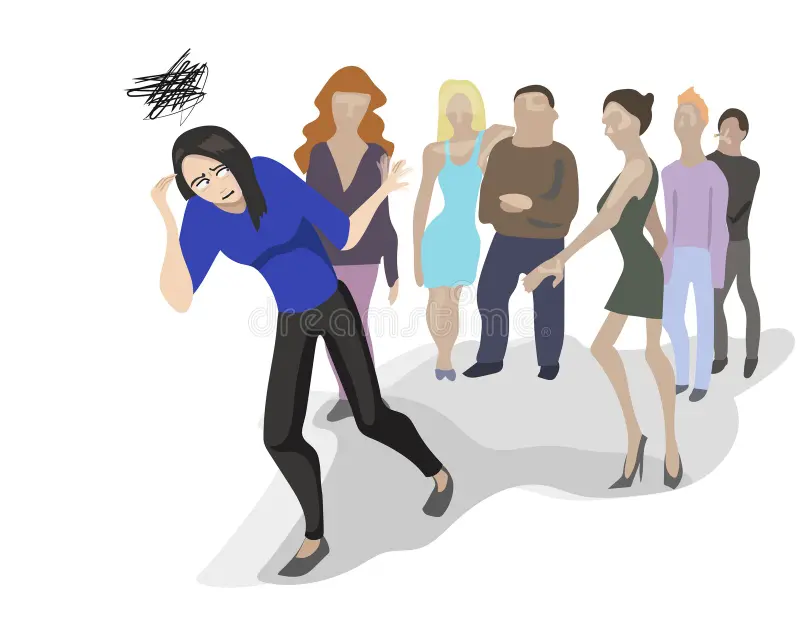
Avoidant Personality Disorder
Overview
AVPD (Avoidant personality disorder) is a chronic mental health condition that is characterised by a long-term pattern of extreme fear of social interaction, an over sensitivity to criticism and a fear of rejection.
People with AVPD have such extreme social anxiety that it can lead to them isolating themselves completely from other people.
This is because they are overwhelmed with feelings of inferiority and inadequacy and they fear embarrassing or humiliating themselves in social situations.
They often feel inferior to their peers as they struggle with feelings of low self-worth and self-esteem and lack the confidence to initiate social contact. This makes it virtually impossible for them to make and sustain friendships or have relationships and this can have a negative effect on their day to day life.
AVPD behaviours can be seen in children but are rarely diagnosed until adulthood as symptoms such as, shyness, sensitivity to criticism, being socially awkward or fearful of strangers, are all a normal part of childhood and adolescent development.
To be diagnosed there needs to be an enduring and inflexible pattern of symptoms and behaviours that does not fade over time.
Causes of avoidant personality disorder
Personality disorders are one of the least understood forms of mental illness and AVPD is no exception. The exact cause remains unknown, although researchers believe the reason for developing the condition can be a result of several contributory factors, which can include both genetic and environmental causes such as:
· Childhood trauma or abuse including neglect or rejection
· Poor parenting or lack of affection and encouragement in childhood
· Temperament in children including traits such as rigidity, hypersensitivity and excessive fear or distress
· Being rejected or criticised by their peers or care giver
· Shy children who don’t outgrow their shyness in adolescence
Symptoms and behaviours of avoidant personality disorder
The main symptom of AVPD is having such a strong fear of rejection, that you avoid being around other people, to the point where you isolate yourself. The symptoms and patterns of behaviour can range from mild to extreme and can differ amongst individuals.
Other signs and behaviours can include, but are not restricted to:
· Having such a poor self-image that they consider themselves inadequate and inferior to others
· Feel the need to be liked by other people
· Are distrustful of others
· Suffer extreme anxiety in social situations
· Avoid sharing intimate feelings or having intimate relationships
· Are loathe to try anything new or take chances
· Suffer from low self-confidence and self- esteem and lack assertiveness
· Make out that potential problems are bigger and much worse than they actually are
· Are afraid that they will embarrass themselves by doing something wrong
· Avoid making decisions
· Tend to lack close friends
· Are vigilant for signs of disapproval or rejection
· Tend to be people pleasers and will avoid conflict at all costs
· Suffer from extreme self-consciousness
· Often have a tense or fearful demeanour and are extremely self-conscious in social settings
· Are reluctant to make friends or socialise with other people unless they are sure they will be liked and accepted
· Believe feedback is negative even when it is not
· Fear the disapproval or criticism of others and are easily hurt by it
· Will self-isolate to avoid social interactions with other people
Related conditions
AVPD often co-exists, overlaps or can result in the development of other mental health conditions such as:
· Agoraphobia
· Borderline personality disorder
· Dependant personality disorder
· Depression and mood disorders
· Substance misuse
Diagnosis and treatment of avoidant personality disorder
People with AVPD often don’t seek medical help as they don’t believe that there is a problem with their thinking or behaviours.
Without treatment the outlook for people with the condition can be bleak as they can often resign themselves to a life of self-isolation. They are also at risk of developing conditions such as depression or substance misuse.
However they are often more likely to seek help for related conditions such as depression as they struggle to make friends or romantic attachments.
So whilst their deep rooted patterns of negative thoughts and behaviours, has lasted for many years, they can be willing to try treatment in order to help themselves so they can begin to develop relationships.
Antianxiety and antidepressant medications can help manage symptoms and your doctor can provide these, but to be diagnosed and treated you should be referred to a mental health professional.
They can diagnose the condition and develop a treatment plan that will include psychotherapy, a form of talking therapy which can be both one to one or family based. This will most likely include:
Cognitive behavioural therapy (CBT)
With CBT the therapist will help you to look at your thoughts and emotions and how they affect your actions. It will teach you to recognise negative thoughts and behaviours and learn healthier and more positive thinking patterns and habits.
Psychodynamic Therapy
Focuses on the psychological roots of emotional suffering, and through self-reflection helps you to look into behaviour patterns that cause problems in your relationships. This helps you to understand yourself better and how you can change the way you relate to people and your environment.
Schema Therapy
Is an integrative approach that builds on CBT as well as other therapeutic techniques. It focuses on the relationship between the therapist and client, and it’s aim is to improve daily functioning and the ability to change, based on understanding early life experiences and their effect on you.
Treatment for AVPD is most affective when family members take part and are supportive in your recovery. Written by Jan, Jeana and Wendy at Barnsley Hypnosis and Counselling (UK). For more free information click above link.





